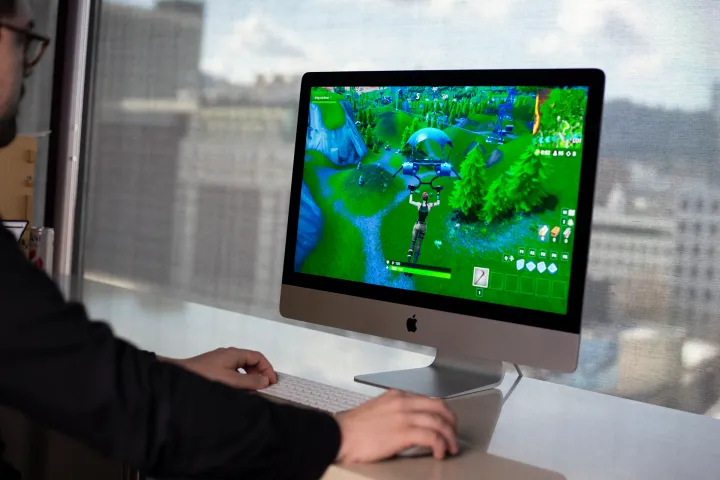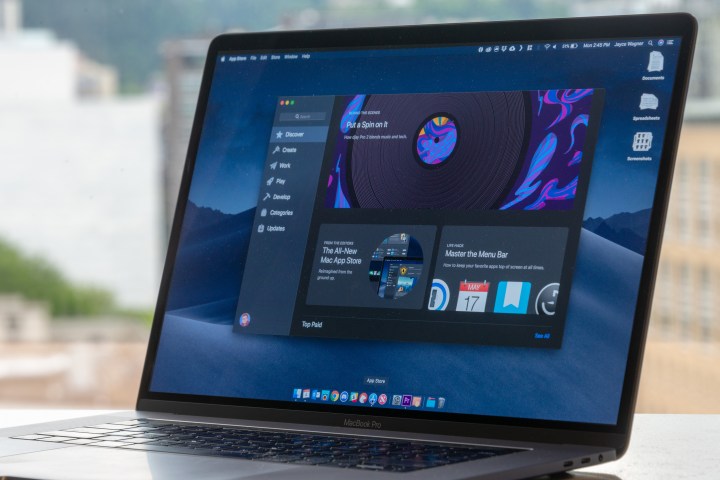
Games have never really found a home on Mac — for good reason. Apple has hardly made an effort, instead relying on Boot Camp to keep the prospect of gaming on a Mac alive.
With the advent of MacOS Catalina, it looks like there’s only more turbulence on the way for Mac gamers. And though Apple might have a plan to fix the situation with Apple Arcade, it’s not the solution most gamers will be satisfied with.
Say goodbye to 32-bit games

When games come to the Mac, they’re often late, and the selection is limited. Mac gamers often rely on third-party companies creating ports — Mac-compatible versions of games — rather than the original companies directly making games for Mac, at least for top-tier AAA games. The time it takes to convert PC game code into code that will work on a Mac explains the delay in games coming to Apple’s platform — if they ever arrive at all.
Apple’s latest operating system, due out this fall, will not support 32-bit apps. That might not sound like a big deal on the surface, but a lot of Mac games are 32-bit, and simply converting them over to 64-bit is no easy feat. At least two Mac games companies have already said this is going to impact the games they sell.
Feral Interactive is one such company, responsible for ports such as Shadow of the Tomb Raider. The company told us it’s looking to update its 32-bit games on a “case-by-case basis.” “The amount of work is significant,” a company representative told us, “and not all games will be updated.” Feral Interactive told us it didn’t have any more information to divulge, so whether or not players who have bought 32-bit apps will get an upgrade to the 64-bit version is unknown at this time. If some don’t get updated by the time MacOS Catalina drops, these games will disappear altogether.
Aspyr was another company that announced it would withdraw from sale all of its 32-bit apps, which includes 27 games such as Bioshock Infinite and Prey. The company announced it would work to convert a number of games over to 64-bit before September (roughly when MacOS Catalina is expected to be released), but clarified that its entire catalog wouldn’t make the cut. Aspyr did confirm that anyone who has bought a 32-bit game from the company will get a free upgrade once the 64-bit version has been released, with an Aspyr representative telling us “[the] 64-bit updates will roll out just as a normal patch would.”
The situation both Aspyr and Feral Interactive find themselves in illustrates the perilous state of Mac gaming in 2019. Restricted access to big-name games and high-end graphics cards means Mac gamers are often left out in the cold, with some resorting to virtual machines running Windows just to get their gaming fix.
Apple Arcade is on the horizon

Despite this bleak outlook, Apple has definitely not given up on bringing games to Mac. The last few years have seen the company pivot towards services in a major way, and Apple Arcade is one of its latest bright ideas.
Apple Arcade is, in a nutshell, a games subscription service. When it launches this fall, you’ll be able to pay a set fee every month to get access to over 100 games, which you can play as much or as little as you like. You’ll be able to access them on any of your Apple devices, and there will be no ads or in-app purchases. There’s offline play and family sharing for up to six people, all wrapped up in Apple’s well-regarded privacy safeguards.
While the price has not yet been announced, a monthly fee of $10, in line with Apple Music, would not surprise us. On the face of it, a price like that for over 100 games that you can play on any device sounds like a pretty sweet deal – with individual games on Windows often costing upwards of $60 a pop, $10 a month for over 100 games feels like a steal. But there’s a catch, meaning it isn’t quite enough to trump Windows gamers just yet.
Apple has signed up plenty of well-known developers to Apple Arcade, such as Sim City creator Will Wright and Final Fantasy mastermind Hironobu Sakaguchi. The games on offer look enjoyable, with Sonic, Lego, and Beyond a Steel Sky among them. But the service is lacking one thing: True blockbuster games.
The name of the game

Of course, it could just be that Apple is saving the biggest game announcements for later, but you would expect it to unveil at least one major AAA game by now if it had secured one in order to build hype. Unless there’s a big surprise on the way, you won’t see games like Assassin’s Creed or Call of Duty coming to Apple Arcade.
In a way, that’s not too surprising. For one thing, major games studios may be reluctant to work with a company that has never truly embraced gaming. There’s a reason for Apple’s ambivalence towards blockbuster games, though. It has its eyes on a different prize.
According to Apple, iOS developers have earned $120 billion from the App Store since it launched in 2008. At the time of writing, seven of the App Store’s ten highest-grossing apps were games, so you can just imagine how much money games have generated on Apple’s mobile devices over the past decade.
Yet the closest you’ll come to a ‘blockbuster’ title on iOS is Fortnite’s mobile edition. Most games on Apple’s handheld devices are fairly casual compared to the AAA fare on Windows, and it’s that segment of the gaming world that Apple is likely targeting with Apple Arcade.
This makes a lot of sense. Graphics cards are not really Apple’s focus when it comes to Macs (yes, you can hook up an external graphics card now, but that’s a very expensive solution), so it’s understandable that Apple is looking elsewhere in the gaming world. Apple has built its iOS platform into a haven for casual gamers; the next step is replicating that on Mac. Put simply, Apple wants to dominate the living room, not the RGB-lit, curtains-drawn, pizza-box-littered games room.
So, there are reasons to be optimistic if you’re a Mac gamer — Apple Arcade looks like a genuinely attractive proposition, and if it can convince developers there’s a thriving games community on Mac then there’s hope in the future. But if you’re looking to play the latest AAA games on MacOS Catalina, it’s going to get worse before it gets any better.



